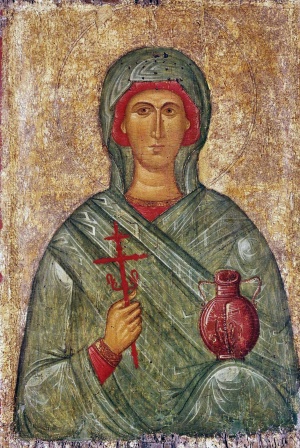Anastasia the Deliverer from Potions
The Great Martyr Anastasia the "Deliverer from Potions", also Anastasia the Healer or Anastasia of Sirmium [note 1] was martyred in Sirmium (Sremska Mitrovica, Serbia), and is known by the Greek term "the Pharmakolitria ", since she has long been venerated by the church as a healer and exorcist. She is commemorated by the church December 22.
Contents
History
Anastasia was from Rome. She was the daughter of Praepextatus and Fausta and was beautiful in appearance, virtuous and from a wealthy family. Her mother instructed her in the faith of Christ. After her mother's death, she was given in marriage to a pagan named Publius Patricius. He subjected his wife to beatings and would keep her slaved in the house. She endured these torments for a short time since Publius drowned early in their marriage.
As a young widow, she never remarried and secretely dedicated her time to the poor, those in prisons and served their needs daily. She would wash their wounds and especially console them during their anguish.
Through her intercessions and prayers, she healed many from the effects of potions, poisons, spells and other harmful substances. This is how she received the honour of Deliverer of Potions. Her deeds and miracles spread throughout the area and her fame brought about her arrest under Diocletian's persecutions. She was tortured and endured many torments and was eventually put to death by fire in the year 290.
In the fifth century the relics of the saint were transferred to Constantinople, where a church was built and dedicated to her. This was the church where St. Andrew the Fool-for-Christ was brought to be cured from his foolishness, there St. Anastasia appeared to him in a dream and encouraged him to continue his ascetic feat.
Later her head and one of her hands were transferred to the Monastery of St. Anastasia the Pharmokolitria, Chalkidiki of Greece.
Hymns
Kontakion in the Second Tone When they that are found in trials and adversities flee unto thy church O Anastasia, they receive the august and wondrous gifts of divine grace which doth abide in thee; for at all times, O Saint of God, thou pourest forth streams of healings for the world.
- Kontakion in the Second Tone
Those in temptations and afflictions hasten to your templeAnd are restored by the grace that dwells in you,For you ever pour forth healings for all the world,O great Martyr Anastasia!
- Troparion in the Fourth Tone
Your lamb Anastasia, calls out to You, O Jesus, in a loud voice:"I love You, my Bridegroom, and in seeking You I endure suffering.In baptism I was crucified so that I might reign in You, and I died so that I might live with You.Accept me as a pure sacrifice,for I have offered myself in love."Through her prayers save our souls, since You are merciful.
- Troparion in the Fifth Tone
As a martyr you emulated the deeds of the martyrs,To whom you ministered,And, striving valiantly, you overcame the enemy.You are an abundant and overflowing source of graceFor all who come to you, O godly-minded Anastasia!
See also
Notes
- ↑ "Hagiographical research suggests that there have been at least four saints named Anastasia, two of them martyrs in Rome in the 250s, one martyred in Sirmium of Pannonia (modern Serbia) in the late third or early fourth century, and one a patrician woman from the time of Justinian. The careers and multilayered conflations of the three (or perhaps two) martyrs named Anastasia have been studied in detail (by Hippolyte Delahaye, Paul Devos and François Halkin); the history is convoluted...; the three martyrs as commonly distinguished are:
- October 12: Anastasia "the Roman," virgin martyr under Diocletian and Valerian.
- October 28/29 (also 12 October, 25 December): Anastasia "the Virgin", martyr under Diocletian.
- December 22: Anastasia pharmakolytria "Poison-Curer," widow and martyr in Sirmium/Sirmio, and her companions."
- (Jane Baun. Tales from Another Byzantium: Celestial Journey and Local Community in the Medieval Greek Apocrypha. Cambridge University Press, 2007. p.117.)
Categories > Church History
Categories > Church History
Categories > Church History
Categories > Church History
Categories > Church History
Categories > Church History
Categories > Liturgics > Feasts
Categories > Liturgics > Feasts
Categories > Liturgics > Feasts
Categories > Liturgics > Feasts
Categories > Liturgics > Feasts
Categories > Liturgics > Feasts
Categories > People > Saints
Categories > People > Saints > Ante-Nicene Saints
Categories > People > Saints > Martyrs
Categories > People > Saints > Saints by century > 3rd-century saints
Categories > People > Saints > Serbian Saints
Categories > People > Saints > Wonderworkers
